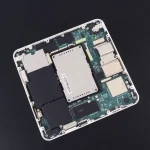Firm predicts optimistic outlook for 2025 PC gaming and exodus

The world of gaming is ever-evolving, with technology and trends shifting at a rapid pace. As we look towards the future of PC gaming, analysts are making bold predictions that are stirring excitement—and concern—among enthusiasts, developers, and retailers alike. With significant changes on the horizon, it’s essential to understand both the opportunities and challenges that lie ahead.
Recent reports suggest that while the gaming PC ecosystem is set for a major boost due to the transition to Windows 11, there are underlying concerns about the long-term sustainability of the market. This article delves deeper into these predictions, exploring the implications for consumers and the gaming industry as a whole.
The optimistic forecast for 2025
According to Jon Peddie Research (JPR), a firm specializing in the PC graphics market, the transition to Windows 11 is anticipated to catalyze a remarkable 35% increase in hardware sales in 2025. This projection places the global market for PC gaming hardware—including desktops, laptops, DIY components, and accessories—at an impressive $44.5 billion.
JPR's methodology employs a purchase motivation model that assesses consumer intent to play video games with specific hardware. This approach suggests that actual consumer spending could exceed their conservative estimates, reflecting a robust demand for high-performance gaming systems.
Current market dynamics and challenges
In contrast to JPR's optimistic outlook, other market research firms like Canalys and IDC have issued forecasts that highlight a potential slowdown in consumer PC sales. For example, Canalys predicts a 3.9% decline in U.S. PC sales in 2025, with a slight recovery projected for 2026. Similarly, IDC anticipates flat sales in the U.S. while forecasting a global market increase of 6.5%.
These varying perspectives underscore the volatile nature of the market, influenced by factors such as:
- Economic uncertainty and inflation affecting consumer spending
- Tariffs impacting component availability and pricing
- Shifts in consumer preferences towards consoles and mobile gaming
The impact of Windows 11 migration
The transition from Windows 10 to Windows 11 is deemed unprecedented, as it necessitates a comprehensive hardware upgrade for a vast number of gamers. JPR analyst Ted Pollak emphasizes that this migration cannot be achieved simply by swapping out graphics cards. Instead, over 100 million gamers will need to upgrade their CPUs, motherboards, and RAM to meet the new system requirements.
This widespread hardware upgrade could result in many gamers opting for prebuilt systems, as they seek convenience and performance rather than attempting to modify existing setups. The DIY market is also adapting, with enthusiasts building new systems alongside their current PCs to bridge the transition smoothly.
Potential exodus from PC gaming
Despite the positive growth projections for hardware sales, JPR also highlights a troubling trend: a projected 13% decrease in entry-level PC gamers over the next five years. This decline could translate to over 10 million gamers exiting the PC gaming platform entirely. Peddie notes that many of these individuals may shift towards consoles, handheld devices, or mobile gaming, which often provide more affordable options.
However, it’s crucial to recognize that not all entry-level players are abandoning PCs. Many are simply upgrading to midrange or high-end systems, which reflects a shift in consumer behavior rather than a complete withdrawal from the platform.
Consumer spending trends
As the gaming market evolves, consumer spending habits are also changing. Best Buy's CEO, Corie Bary, stated that shoppers are increasingly price-conscious, seeking value in their purchases. This trend indicates a bifurcation in consumer behavior, where some are willing to invest in high-quality systems if they perceive significant value.
Key factors influencing consumer spending include:
- The availability of high-performance gaming systems
- Competitive pricing and promotional offers
- Consumer education about hardware capabilities and performance
The future of the gaming industry in 2025
Looking ahead, the gaming industry is poised for transformative changes that will shape the landscape of PC gaming. As new technologies emerge and gaming experiences evolve, it will be vital for industry stakeholders to adapt and innovate. Key considerations for the future include:
- Advancements in hardware performance, including graphics cards and processors
- The integration of artificial intelligence and machine learning in gaming
- Increased emphasis on cross-platform gaming and services
As we approach 2025, these trends signify a dynamic period for the gaming industry, where adaptability and foresight will be essential for success.
For further insights into the gaming landscape, check out the following video that discusses the evolving nature of PC gaming and what to expect in the coming years:
Conclusion
In summary, while the forecast for PC gaming in 2025 appears optimistic in terms of hardware sales, underlying challenges must be addressed. The potential exodus of entry-level gamers and the impact of economic conditions highlight the need for strategic planning within the industry. By recognizing these trends and adapting accordingly, stakeholders can ensure a vibrant future for PC gaming.




Leave a Reply